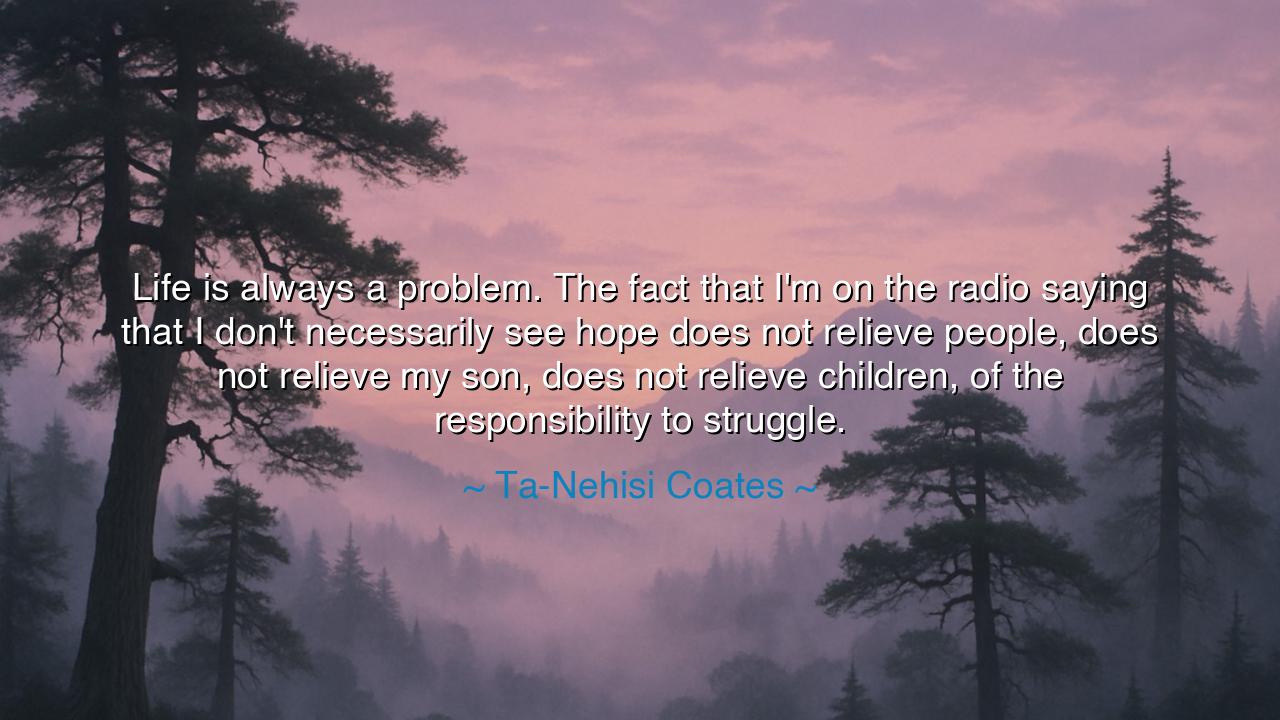
Life is always a problem. The fact that I'm on the radio saying
Life is always a problem. The fact that I'm on the radio saying that I don't necessarily see hope does not relieve people, does not relieve my son, does not relieve children, of the responsibility to struggle.






“Life is always a problem. The fact that I'm on the radio saying that I don't necessarily see hope does not relieve people, does not relieve my son, does not relieve children, of the responsibility to struggle.” — thus spoke Ta-Nehisi Coates, a modern philosopher of truth and pain, whose words cut through illusion like a blade through mist. His message is neither despair nor cynicism; it is a call to endurance, a declaration that even when the sky darkens and hope fades from sight, one must still struggle. For Coates speaks not of the soft hope that comforts, but of the fierce strength that persists when comfort is gone. His voice rises from the long memory of human suffering, echoing the wisdom of the ancients: that life is conflict, and only through struggle does the soul become strong.
The ancients would have understood Coates well. To them, struggle was not a curse but a crucible. The Greeks called it agon, the sacred contest through which heroes were born. Odysseus, after ten years of war and ten years of wandering, did not reach home by miracles or mercy, but by endurance — by fighting when all seemed lost. So too does Coates remind us that life offers no guarantee of victory, and yet demands that we rise each day to fight anew. The wise man does not wait for hope to arrive before acting; he acts so that hope may one day exist. For as long as breath remains, responsibility remains — to one’s children, to one’s people, to the self.
Coates speaks these words from a history heavy with injustice. He belongs to a lineage that has known the weight of oppression — the descendants of those whose chains clattered through the centuries. Yet he does not speak of bitterness; he speaks of continuance. He teaches that even when systems fail, and promises rot in the mouths of the powerful, the duty to live and to strive remains. “Life is always a problem,” he says — not as complaint, but as revelation. To live is to wrestle with imperfection, to seek meaning in a broken world. The absence of hope does not absolve us from action; it demands it.
Think of Frederick Douglass, born into bondage, who said, “If there is no struggle, there is no progress.” Like Coates, he did not believe freedom would be given — it had to be fought for, even when success seemed impossible. He knew that struggle itself is redemptive, that dignity is found not in winning, but in resisting. When Coates speaks to his son, he teaches this same inheritance: that the measure of a man is not in the world’s fairness, but in his refusal to surrender to its cruelty.
There is deep wisdom in Coates’s unwillingness to promise hope. The ancients knew that false hope weakens the will. Sisyphus, condemned to roll his stone forever, found meaning not in escaping his burden, but in accepting it fully. So too does Coates ask us to confront reality as it is — harsh, unjust, unpromising — and yet continue the climb. This is not despair; it is courage without illusion. It is the strength to act rightly even when the universe offers no reward. In such strength lies true freedom.
From this truth emerges a lesson for all generations: do not wait for hope to move you. Let responsibility be your guide, and let struggle be your prayer. Life will not spare you pain, nor will justice arrive at your command. But if you labor, if you rise when the world presses you down, you will forge a light within that no darkness can extinguish. The wise do not ask for an easy road; they prepare themselves to walk the hard one with dignity.
Therefore, O listener, take this teaching to heart: when hope fades, do not fall into silence. Stand, even in the storm. Teach your children to stand. For the struggle itself — the act of living, resisting, creating — is sacred. Life will always be a problem, as Coates has said, but in the noble striving of imperfect beings lies the highest proof of their humanity. Though victory may never be certain, struggle itself is victory — the quiet defiance of the soul that refuses to die while breath still stirs within it.






AAdministratorAdministrator
Welcome, honored guests. Please leave a comment, we will respond soon